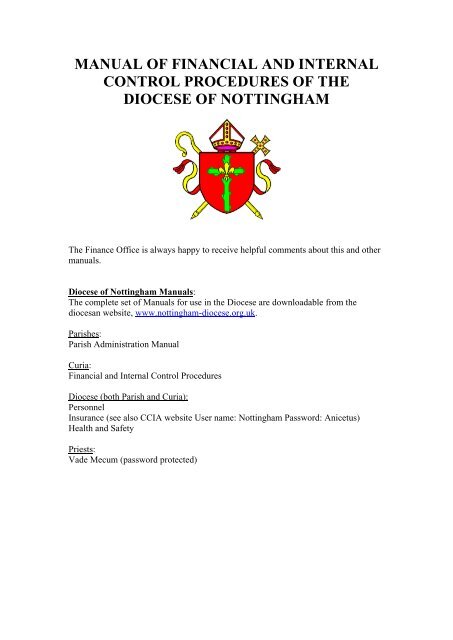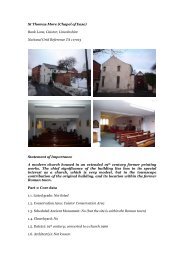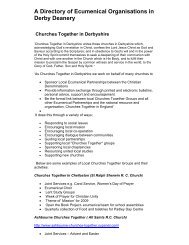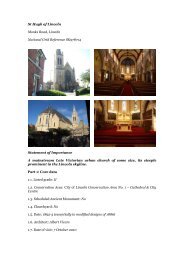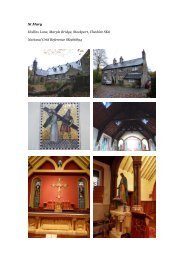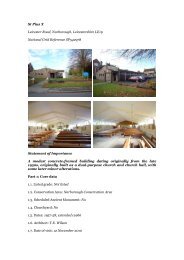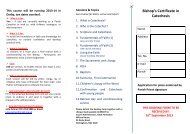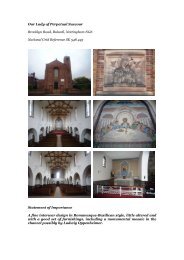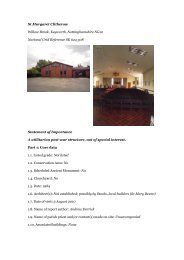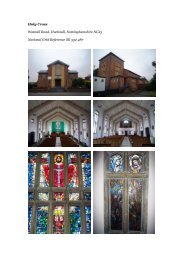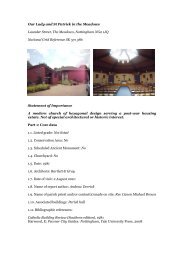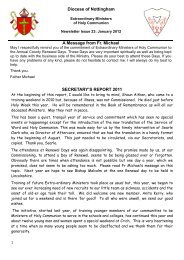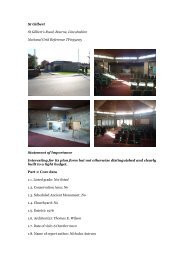Manual of Fiancial & Internal Control Procedures - Diocese of ...
Manual of Fiancial & Internal Control Procedures - Diocese of ...
Manual of Fiancial & Internal Control Procedures - Diocese of ...
Create successful ePaper yourself
Turn your PDF publications into a flip-book with our unique Google optimized e-Paper software.
MANUAL OF FINANCIAL AND INTERNAL<br />
CONTROL PROCEDURES OF THE<br />
DIOCESE OF NOTTINGHAM<br />
The Finance Office is always happy to receive helpful comments about this and other<br />
manuals.<br />
<strong>Diocese</strong> <strong>of</strong> Nottingham <strong>Manual</strong>s:<br />
The complete set <strong>of</strong> <strong>Manual</strong>s for use in the <strong>Diocese</strong> are downloadable from the<br />
diocesan website, www.nottingham-diocese.org.uk.<br />
Parishes:<br />
Parish Administration <strong>Manual</strong><br />
Curia:<br />
Financial and <strong>Internal</strong> <strong>Control</strong> <strong>Procedures</strong><br />
<strong>Diocese</strong> (both Parish and Curia):<br />
Personnel<br />
Insurance (see also CCIA website User name: Nottingham Password: Anicetus)<br />
Health and Safety<br />
Priests:<br />
Vade Mecum (password protected)
FINANCIAL AND INTERNAL CONTROL<br />
Generally the Charity is a large one. However the number <strong>of</strong> people employed at any<br />
one <strong>of</strong>fice is not usually large, making internal control more difficult. In this case<br />
there is a particular duty on department heads to ensure that special care is taken over<br />
financial matters in particular when authorising and approving expenditure.<br />
1
THE BOARD OF DIRECTORS<br />
1. The running <strong>of</strong> the Charity is the legal responsibility <strong>of</strong> the Board <strong>of</strong> Directors<br />
<strong>of</strong> the Company. (Until 31 st March 2010 it was the responsibility <strong>of</strong> the<br />
Trustees). This Company is referred to as the charity or the <strong>Diocese</strong> in this<br />
manual.<br />
2. The Board delegates the responsibility <strong>of</strong> keeping proper books and records to<br />
the Finance Office. The Annual Report & Accounts and the budgets are<br />
prepared by the Finance Office and are formally approved by the <strong>Diocese</strong>.<br />
3. The Company has the power <strong>of</strong> appointing new Directors and the Bishop has<br />
an effective veto over the decisions <strong>of</strong> the Board. A new Director indicates<br />
the formal taking up <strong>of</strong> responsibilities by signing the notification to<br />
Companies House.<br />
4. The Board meets formally at least four times per annum.<br />
5. Each <strong>of</strong>fice, department or service, or by whatever name it is known, is under<br />
the formal control <strong>of</strong> the Board.<br />
6. Independent pr<strong>of</strong>essional advice is available to the Directors.<br />
7. The Directors’ liabilities are insured.<br />
Segregation <strong>of</strong> Duties<br />
8. Where possible key duties are segregated. A person having access to cash or a<br />
cheque signatory should not also be responsible for accounting records.<br />
9. Unless otherwise authorised by the department head incoming post should be<br />
opened by two people.<br />
10. A separate record will be maintained <strong>of</strong> money due into the charity, for<br />
example when legacies have been notified, or for Gift Aid and other<br />
donations. Follow up checks are then made to ensure that it has been received.<br />
Cash and Bank Balances.<br />
11. A list <strong>of</strong> bank accounts, their signatories (which will always include the<br />
Bishop, the Moderator <strong>of</strong> the Curia, the Chancellor, both Vicars General and<br />
the Financial Secretary) and their purpose will be recorded in the Finance<br />
Office. Accounts may be opened and closed only on the authority <strong>of</strong> the<br />
Finance Office.<br />
12. It is the policy <strong>of</strong> the Board that, where possible, new accounts are not opened<br />
and that all transactions take place through the main Diocesan account.<br />
13. The policy <strong>of</strong> the <strong>Diocese</strong> is that all cheques for payments above £5 thousand<br />
require two signatures, one <strong>of</strong> which will be one <strong>of</strong> those mentioned in the<br />
previous paragraph. No signatory may sign a cheque payable to him or<br />
herself. It is obviously not permitted to avoid the second signature on cheques<br />
above £5,000 by making out a series <strong>of</strong> cheques for under £5,000.<br />
2
14. Incoming cheques should be banked daily. If this is not possible they should<br />
be kept in a safe and banked as soon as possible and in any case at least<br />
weekly. Where they are banked by post full details should be kept (eg by<br />
photocopying) so that if mislaid replacement cheques can be obtained.<br />
Banking <strong>of</strong> cash should be gross and cash not held back for petty cash<br />
15. The charity’s money must be kept quite separately from personal money.<br />
(However this does not prevent expenditure being incurred originally in a<br />
personal name with a view to reimbursement at a later stage by the charity).<br />
16. Checks <strong>of</strong> cash books and the paying-in slips and cheque payments should be<br />
made from time to time by someone separate from the person originally<br />
recording the transaction. Bank reconciliations should be carried out each<br />
month, then independently checked and reviewed.<br />
17. Accounts may not go overdrawn without prior approval.<br />
18. When making payments, expenditure must be properly authorised and<br />
presented with the supporting documentation to the cheque signatories.<br />
19. Means <strong>of</strong> payments such as cheque books, building society passbooks and<br />
bank mandate forms must be kept in a safe with access limited.<br />
20. If possible the preparation <strong>of</strong> documentation for authorisation should be<br />
undertaken by someone other than the person authorising the payment. The<br />
person authorising should ensure that the goods or service being paid for have<br />
been ordered. The authorisation should be <strong>of</strong> original invoices only, if<br />
possible, (in order to ensure that an invoice is not paid twice). It should be<br />
stamped PAID with the date (or marked in some way in order to prevent its<br />
being paid twice) which should be in red. The authorisation is <strong>of</strong> the invoice<br />
and not the statement, again to avoid payments being made twice. Be<br />
particularly careful to avoid double payments where invoices have been<br />
emailed and can be downloaded and authorised twice in error.<br />
21. An order shall only be placed with the approval <strong>of</strong> the department head. If<br />
over £300 this will need to be written. Continuation <strong>of</strong> the following authority<br />
limits were determined by the Board at its meeting on 28 th September 2011.<br />
£300- £1000 Head <strong>of</strong> Department<br />
£1,000 - £5,000 Financial Secretary/ Moderator <strong>of</strong> the Curia<br />
£5,000 - £50,000 (£100 thousand having consulted the Board) Management<br />
and Finance Committee<br />
£5,000 - £250,000 (£650 thousand having consulted the Board) Building and<br />
Sites Committee – property transactions only.<br />
Above these limits Board <strong>of</strong> Directors.<br />
22. The record placed <strong>of</strong> orders should allow for the amount <strong>of</strong> outstanding orders<br />
to be ascertained.<br />
3
23. Under no circumstances whatsoever are blank cheques to be signed in<br />
advance. In the words <strong>of</strong> the Charity Commission guide, “It is a<br />
dangerous breach <strong>of</strong> financial controls” and “the practice <strong>of</strong> signing<br />
blank cheques would be regarded as neglecting the duty <strong>of</strong> care owed by<br />
the charity”.<br />
24. Cheque expenditure is to be recorded in the cash book with details <strong>of</strong> the date,<br />
payee, cheque number and amount. Cheque book stubs are to be completed at<br />
the time <strong>of</strong> payment (as they form part <strong>of</strong> the charity’s accounting records).<br />
Where, exceptionally, a card has been provided for use for charity expenditure<br />
a separate account will be associated with it to assist with control <strong>of</strong> that<br />
expenditure.<br />
25. Cash payments are to be kept to a minimum because <strong>of</strong> the difficulties <strong>of</strong><br />
internal control over them.<br />
26. Proper supporting independent documentation for all payments and remittance<br />
advices for receipts must be retained and kept in the designated files and be<br />
available for internal check or external audit however the payment or receipt is<br />
made.<br />
27. Payment for expenses to be reimbursed should be submitted in a reasonable<br />
time, normally monthly, authorised independently (normally by a department<br />
head) and properly supported in the usual way as noted above.<br />
Accounting Records<br />
28. There will be proper records kept, enabling an audit trail from the original<br />
documents to the final accounts.<br />
29. Allocation <strong>of</strong> expenses to the right account is important, particularly where a<br />
restricted fund is to be charged.<br />
30. Budgets will be set in discussion with each department and agreed by the<br />
Trustees. Underspending against budget in a year cannot be carried forward<br />
or transferred to another account without approval <strong>of</strong> the Finance Office.<br />
31. It is intended that a fixed asset register will be prepared. Nothing is<br />
capitalised in the accounts unless its value is greater than £5,000. This does<br />
not prevent a fixed asset register record <strong>of</strong> details <strong>of</strong> items with lower values<br />
but they will not be treated as capital expenditure in the accounts and<br />
depreciated.<br />
32. Each person for whom a computer is provided is responsible for their own<br />
computer housekeeping routines, including back up, remote back up and other<br />
housekeeping routines such and also for ensuring that back up media are<br />
physically destroyed when no longer required. A department head is<br />
responsible for ensuring the same for the department’s network server and also<br />
for ensuring that hard drives <strong>of</strong> computers are destroyed when no longer<br />
required. A remote back up should be taken at least monthly.<br />
4
Guardianship <strong>of</strong> Assets<br />
33. Assets are generally held in the name <strong>of</strong> the Company. Where the strict<br />
requirements <strong>of</strong> legislation are followed, whereby the beneficial ownership <strong>of</strong><br />
the assets is beyond doubt, they may held in other names.<br />
34. The Board is responsible for the Investment Policy, a copy <strong>of</strong> which is<br />
available from the Finance Office.<br />
35. Investment performance is the responsibility <strong>of</strong> the Management and Finance<br />
Committee <strong>of</strong> the Board and is to be brought to its attention.<br />
36. The opening and closing <strong>of</strong> bank accounts are to be authorised by the charity.<br />
Dormant accounts should be reviewed from time to time and closed if<br />
necessary.<br />
37. The fixed asset register needs to be checked to the fixed assets themselves<br />
from time to time. The condition <strong>of</strong> the fixed asset should be noted at that<br />
time.<br />
38. A proper register is maintained <strong>of</strong> land and buildings. This should be<br />
expanded to include data relevant to their maintenance and insurance. It<br />
should also include, for leased property, details <strong>of</strong> the terms <strong>of</strong> the lease. A<br />
proper diary system is to ensure that the relevant notices are given at the<br />
correct time for leased property.<br />
39. Generally, where a property is let, the <strong>Diocese</strong> as landlord should insure and<br />
then pass the cost on to the tenant through the lease.<br />
40. The disposition (including selling or leasing) or charging <strong>of</strong> land is subject to<br />
the special requirements for them under the Charities Acts.<br />
41. Protection <strong>of</strong> the documents <strong>of</strong> title are the responsibility <strong>of</strong> the property<br />
department. That department will also have responsibility for other legal<br />
documents. It is essential that a receipt is always obtained for legal<br />
documents which leave the building.<br />
Special Computer <strong>Procedures</strong><br />
43. All Curia departments must:<br />
a) ensure that personal data held is secure.<br />
b) this includes physical security – doors which protect rooms which provide<br />
access to personal data should be kept locked.<br />
c) password protection should be used to control access to information and<br />
encryption if appropriate for very secure data.<br />
d) ensure proper arrangements for back up.<br />
5
e) train its staff on procedures including not using the personal data other than<br />
for use for the Parish.<br />
f) provide records as necessary so it is clear who has had access to personal data.<br />
44. Use <strong>of</strong> antivirus s<strong>of</strong>tware is compulsory.<br />
45. Physical controls are important and a server with sensitive data on it should be<br />
locked physically as should the back- up media.<br />
46. Installation <strong>of</strong> new s<strong>of</strong>tware will require the approval <strong>of</strong> the head <strong>of</strong><br />
department. All s<strong>of</strong>tware must, <strong>of</strong> course, be properly licensed.<br />
Miscellaneous<br />
47. Meeting notes should be circulated within 7 days <strong>of</strong> a meeting. It takes no<br />
longer to prepare them in good time as at a later date and preferable to have<br />
them while the meeting is fresh in the minds <strong>of</strong> those attending.<br />
48. While the <strong>Diocese</strong> is in principle happy to support those who wish to take part<br />
in national activities connected with the Church, this requires the prior<br />
approval <strong>of</strong> the Board. There are two aspects to this. The first is that the<br />
priority over an employee’s duties is the responsibility <strong>of</strong> the <strong>Diocese</strong>. The<br />
second is that there can be cost implications, for example for additional<br />
support. The approach should give details and the approval <strong>of</strong> the head <strong>of</strong> the<br />
relevant department will also be required.<br />
49. The <strong>Diocese</strong> is under a duty under certain circumstances to make a report to<br />
the Charity Commission if a serious incident takes place. In practice such a<br />
matter will be associated with a possible insurance claim and the advice <strong>of</strong> the<br />
<strong>Diocese</strong>’s insurers will be sought before a report is made.<br />
50. The Management and Finance Committee will consider requests for mobile<br />
phones to be provided to Curia employees who travel on Diocesan business<br />
widely.<br />
51. Loans may not be made to members <strong>of</strong> staff for cars or otherwise (policy<br />
confirmed by the Board 28 th September 2011).<br />
Adopted October 2011.<br />
6


